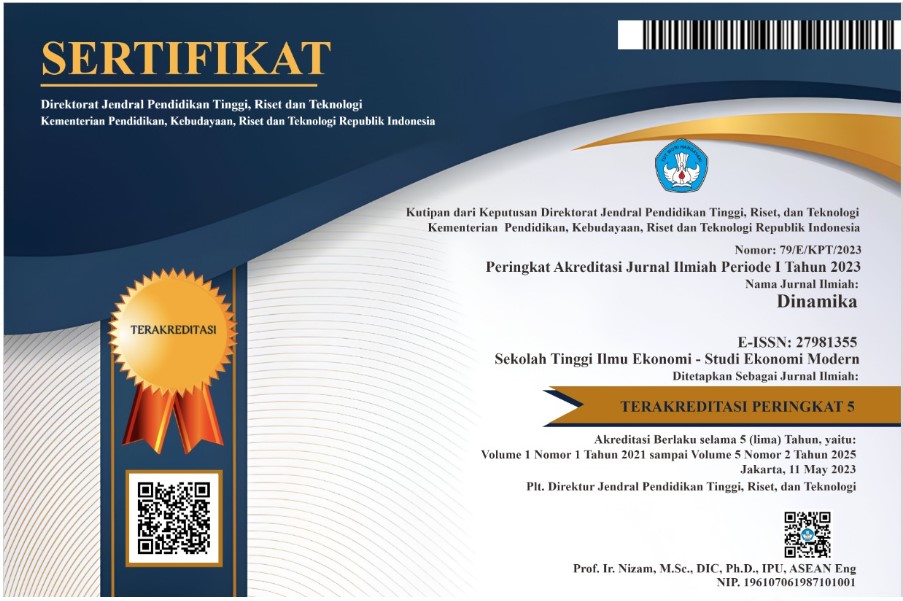PERAN BANK SYARIAH INDONESIA (BSI) DALAM MENDORONG PERTUMBUHAN INDUSTRI HALAL DI INDONESIA
DOI:
https://doi.org/10.51903/dinamika.v4i1.427Keywords:
Industry, Ecosystem, Halal, BSIAbstract
Indonesia is a country with the 4th ranking for the halal industry in the world with a majority Muslim population which is considered less optimal in managing the growth of the halal industry compared to other countries in various sectors. This research aims to examine whether the existence of BSI can encourage the growth of the halal industry in Indonesia. The method applied in this research is a descriptive method with a qualitative descriptive research type, which utilizes a literature study approach. The research results show that. BSI has distributed financing to the halal value chain sector Rp. 18 trillion, consisting of financing for the halal food and beverage subsector Rp. 9 trillion, pharmaceuticals and cosmetics Rp. 7 trillion, and fashion and fashion Rp. 3 trillion. Carrying out MSME development programs through the Sharia KUR Recipient MSME Program, BSI UMKM Center, and BSI Entrepreneurial Talent Competition
References
[2] E. Saepudin, Ekosistem Industri Halal, vol. 5. 2022. doi: 10.30595/pssh.v5i.420.
[3] A. A. Annisa, “Kopontren dan Ekosistem Halal Value Chain,” J. Ilm. Ekon. Islam, vol. 5, no. 01, p. 1, 2019, doi: 10.29040/jiei.v5i01.398.
[4] F. Ahmad Fauzi, N. Karia, and M. A. Mohd Mokhtar, “The antecedents of halal competency model: towards improvement of halal certification for SMEs’ products,” Int. J. Business, Econ. Law, vol. 14, no. 5, pp. 18–28, 2017.
[5] Dinar Standard, “State of the Global Islamic Economy Report: Unlocking Opportunity,” State Glob. Islam. Econ. Rep. 2020/21, pp. 4–202, 2022, [Online]. Available: https://haladinar.io/hdn/doc/report2018.pdf
[6] H. H. Adinugraha, Perkembangan Industri Halal di Indonesia | i. 2022.
[7] P. Ekspor, P. Halal, T. Current, A. Balance, and D. I. Indonesia, “Public life,” Routledge Libr. Ed. Socrates, vol. 3–5, no. 6, pp. 82–141, 2021, doi: 10.4324/9781315763118-10.
[8] I. Sechan, D. N. Ihsan, and P. K. Ningsih, “The effect of the halal industry on the export of Indonesian halal products The effect of the halal industry on the export of Indonesian…,” J. Enterp. Dev., vol. 5, no. 1s, p. 2023, 2023.
[9] R. Nurrachmi, “The Global Development of Halal Food Industry: A Survey,” Tazkia Islam. Financ. Bus. Rev., vol. 11, no. 1, pp. 41–56, 2018, doi: 10.30993/tifbr.v11i1.113.
[10] Lady Yulia, “Halal Products Industry Development Strategy Strategi Pengembangan Industri Produk Halal,” J. Bisnis Islam, vol. 8, no. 1, pp. 121–162, 2015.
[11] M. I. Khan and A. Haleem, “Understanding ‘ Halal ’ and ‘ Halal Certification & Accreditation System ’ - A Brief Review,” Saudi J. Bus. Manag. Stud., vol. 1, no. 1, pp. 32–42, 2016.
[12] H. Anam, “Manajemen Risiko Operasional Bank Syariah; Teori dan Manfaat,” J. At-Tamwil Kaji. Ekon. Syariah, vol. 5, no. 1, pp. 16–31, 2023.
[13] M. R. Fadli, “Memahami desain metode penelitian kualitatif,” Humanika, vol. 21, no. 1, pp. 33–54, 2021, doi: 10.21831/hum.v21i1.38075.
[14] KNEKS, Rekomendasi Kebijakan Strategi Pengembangan Keuangan Mikrosyariah Di Indonesia. 2019.
[15] Bank Syariah Indonesia, “Laporan Tahunan Bank Syariah Indonesia 2022,” pp. 84–92, 2022.
[16] B. P. Statistik and K. Blitar, “Pertumbuhan Ekonomi Kota Blitar Tahun 2022,” no. 01, pp. 1–12, 2023.
[17] Data Indonesia id, Ini 8 Bank Syariah dengan Pembiayaan Terbesar per Kuartal I/2022, https://dataindonesia.id/korporasi/detail/ini-8-bank-syariah-dengan-pembiayaan-terbesar-per-kuartal-i2022, diakses pada 26 Oktober 2023
[18] “detikcom Year in Review 2022.pdf.”
Downloads
Published
Issue
Section
License
Copyright (c) 2024 Dinamika: Jurnal Manajemen Sosial Ekonomi

This work is licensed under a Creative Commons Attribution-ShareAlike 4.0 International License.












